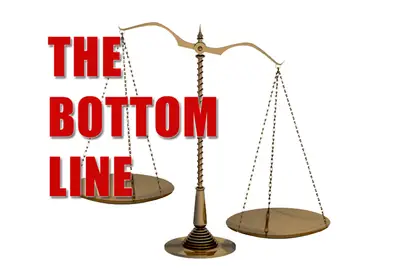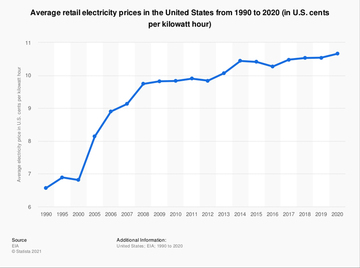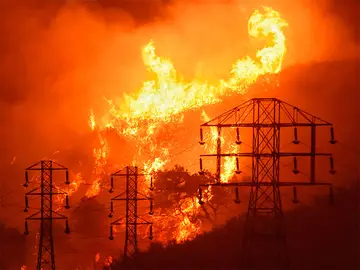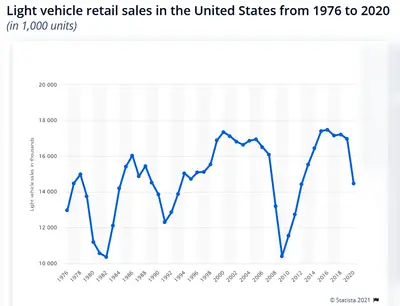The Real Story On Electric Vehicles +VIDEO - UPDATED WITH ADDED COMMENTARY
 |
"An even bigger question, however, is why do we need electric vehicles?"
 |
Author of THE ETHANOL PAPERS
Exec. Vice President/Co-Publisher
THE AUTO CHANNEL
 Pete & Joe |
When talking about high gasoline prices in an interview, Pete Buttigeek, Secretary of Transportation in the Bidumb mis-administration, said that Americans should buy electric cars so they:
Here's some of the things that Buttigeek didn't say:
• People will still have to worry about constantly increasing electricity prices.
• They will have to worry about the ability to charge their vehicles during blackouts and brownouts from the antiquated electric grid system, not to mention the incredible fire damage caused by downed power lines - something that has become more and more frequent in some areas, like California, our most populous state.
• He didn't mention that EV owners will have to worry about long charging times, and long waiting lines to get a charge.
• He didn't mention that while we're still waiting for EV and battery technology to be perfected that there are serious risks regarding batteries overheating and exploding in the vehicles.
• And for some strange reason, he made no mention of the slave labor-like conditions involved in mining cobalt, an essential material used to make lithium batteries.
• Likewise, Buttigeek made no mention of turning our dependence on evil oil regimes and companies that control the market into dependence upon a malevolent communist China that controls a large part of the lithium battery industry and EV car manufacturing facilities.
While we, at The Auto Channel, believe that electric vehicles are the vehicles of the future, the pressingly big question about this is the same question that was first posed regarding EVs more than a century ago: When will that future arrive? It's not tomorrow. It's not next year, or the year after, or the year after that. In fact, people may still be asking when will the EV future arrive 50 years from now.
An even bigger question, however, is why do we need electric vehicles?
The answer is, we don't. There's nothing wrong with the internal combustion engine (ICE). The engines work great, they move vehicles as fast as is needed for short and very long trips. There are plenty of people already trained in maintaining internal combustion engines; the existing refueling infrastructure for ICE vehicles is enormous, and there are loads of ancillary industries with millions of employees who support their families because of their jobs.
The only thing wrong with internal combustion engines is the filthy, deadly petroleum oil-based fuels that have been primarily used to power them. If we had a cleaner, safer, healthier fuel, that wasn't dependent on evil regimes and companies, then internal combustion engines would remain relevant and desirable maybe forever.
As it happens, we do have a better fuel. Actually, there are two of them and they're both alcohol based: They are ethanol and methanol, and they are available right now to be used in every single type of internal combustion engine.
Taking into account the entire life cycle of building a vehicle, through its years of operation and maintenance, to its final rest stop in a junk yard, an internal combustion engine vehicle running on a high level of ethanol fuel is as clean or cleaner than an electric vehicle.
There's lots good things I can say about ethanol and methanol, after all, I wrote two books about alcohol fuels, one of which is 600-pages long. But because the focus of this editorial is the real story about electric vehicles, I want to explore the reasons why there is such a frantic push from car makers and politicians to switch to EVs, while ignoring better, immediately available options.
The "poster boy" of the EV movement is catastrophic man-made climate change. The hysteria over anthropogenic global warming, or global freezing, has been with us for about 50 years. I wrote my first editorial regarding the climate change threat for the Orlando Sentinel newspaper around 1973.
But, the alarm over catastrophic climate change goes back many more decades. For example, in the early 1920s,
credible sources reported:
- "The Arctic Ocean is warming up, icebergs are growing scarcer and in some places the seals are finding the water too hot...Within a few years, due to the ice melt the sea will rise and make most coastal
cities uninhabitable."
Moreover, some of the world's loudest climate change alarmists have ignored their own dire predictions of rising tides and purchased homes on or very close to the ocean. People like Barack Obama, Al Gore, Bill Gates, John Kerry, and Joe Biden.
Let's say I'm wrong and that the predictions are correct; that we have 5 years, or 7 years, or 15 years, or 20 years before climate change kills us all. Then what are we waiting for?
In 1990, when Iraq invaded Kuwait for their oil, it only took a few months for a near-worldwide coalition to engage in a violent hot war to save Kuwait. If catastrophic man-made climate change is real, and all living creatures on Earth are in danger, why hasn't anything concrete been done to eliminate the threat, and ban the use of petroleum oil fuels?
When the specter of Covid 19 threatened the world, the world reacted swiftly with bans, masks, and mass shutdowns. The Covid virus is bad, but catastrophic climate change threatens to kill everyone, not just those who refuse to wear masks or get vaccinated.
We know that petroleum oil fuel emissions have killed and sickened hundreds of millions of people around the world over the last century, so if we're all now facing imminent death because of these same fuel emissions, why hasn't our government - all governments - done everything possible to stop the threat by immediately terminating the use of all petroleum oil fuels?
The answer to that question, of course, is that the climate change threat is a fraud, and most politicians know it. At the least, if world governments mandated the use of high ethanol or methanol blend levels to fuel internal combustion engine vehicles it could be said that they are doing something in the interim, that they are pretending to take the grave threats seriously. But the threats are so fallacious that they don't feel the need to pretend.
This brings us to the next question "Why is there such a rush by automakers and politicians to hide the truth, and use the fraudulent alarm over climate change to switch to electric vehicles?"
The answer to that question is a financial one.
Sales of new light-vehicles (cars, pick-ups, SUVs, and vans) are stagnant. They've been stagnant for nearly half a century. Despite the U.S. population increasing by about 50% from 1976 to today, annual new light-vehicle sales have stayed pretty much the same. Median and average sales per year have remained at a little over 14 million units.
Much of the new vehicle auto industry has been struggling for a few decades. It wasn't very long ago that the big three American automakers went to Washington to beg for help.
Two of those companies went bankrupt - General Motors and Chrysler. The government wrongly provided a huge amount of money to bail them out, essentially forcing American taxpayers to pay for vehicles that they had previously bought and paid for. Chrysler was then acquired by Fiat, a foreign company, thereby making the entire Chrysler/Dodge/Jeep/Ram group a foreign automaker, something that the bailout was ostensibly supposed to prevent.
General Motors took the billions of dollars that Washington gave them, screwed millions of common share investors out of billions of dollars, and for all intents and purposes has now become a puppet of the Chinese government in the hope of becoming a big player in Chinese new vehicle sales.
Ironically, Chinese consumers are much like auto buyers everywhere, they would rather buy European and Asian cars and trucks. For example, in 2019, the Buick Excelle GT was the #7 best selling car in China. That seems pretty okay, but consider that Volkswagen had 4 separate models that placed in the top ten list: #1, #6, #8, and #9. The other five vehicles in the Top Ten list were all Asian. The four Volkswagen models out sold the one Buick model by about 5-to-1. No other GM products made the Top Ten list. (https://www.statista.com/statistics/1050864/china-best-selling-car-models-sales-volume/)
Ford was able to avoid bankruptcy by selling off various non-automotive properties and getting rid of Aston Martin, Jaguar, Land Rover, Volvo, and its controlling interest in Mazda. Ford did take a $6 billion loan from Washington that I think has still not been paid back.
European automakers have also been struggling: Sweden's Saab closed permanently, Volvo had to sell to Ford, and is now owned by Geely Holding, a Chinese company.
The huge Volkswagen/Porsche/Audi/Seat group seemed to be doing fine, buoyed by the group's clean burning, energy efficient diesel powered vehicles - that is until it was revealed that they lied about the actual results of their testing. To date, the diesel scandal has cost the VW group over $35 billion and incalculable credibility.
Therefore, in short, automakers need a paradigm shift in new vehicle sales. In fact, they a windfall. They need something that breaks sales out of the 50-year rut. They need annual sales in the U.S. and other traditional markets to increase 50%, 100%, 200% per year, year-to-year.
The only way to accomplish this is if a significant part of the existing on-road fleet changes out over each year. New audio systems won't be enough reason to stimulate the change; new upholstery fabrics won't do it; re-designed LED headlights are not the seismic innovation that cause millions of vehicle owners to literally abandon their fully-functioning internal combustion engine automobiles for something new. There has to be a totally revolutionary, life-changing, hair-restoringly wonderful, fountain-of-youth transformative event. Unfortunately, magic wands and Aladdin's lamps are in very short supply.
But with a few well-placed government edicts, and presidential executive orders banning the production of new internal combustion vehicles, along with eventually banning re-sales of older internal combustion vehicles, which is something The Auto Channel believes will eventually be threatened, if not actually enacted, it could be possible to force sales growth in America up over the 20 million mark to 25 million, 30 million, maybe 40 million new vehicles per year for several years. This would surely give the automakers the windfall that they need.
Why are the politicians, particularly those in the states that have been in terrible financial condition, going along with this? Because the sales tax revenue from this windfall of electric vehicle sales would be just what federal and state coffers need to try to recover from years of terrible mismanagement (from both political parties). Consequently, state governors and state legislatures are adopting premature, ill-conceived regulations to force electric vehicles onto the market in the hope that the windfall tax revenue will take the pressure off them to do their jobs properly and be financially responsible.
In closing, the switch to electric vehicles is a scam. It's hiding behind the hoax of catastrophic man-made climate change, and it's being used to rescue the auto industry, one of the oldest and largest industries in the world. The climate change hoax and EV scam is being used to save lots of political asses (I mean that literally and figuratively), and it's being done in a manner that will have as little negative effect as possible on the enormous oil industry because by ignoring real solutions like ethanol fuel, gasoline and diesel will continue to be our dominant liquid fuel for many decades while waiting for the future of electric vehicles to arrive. Allowing the oil industry to skate and stay alive, while continuing to poison all of us, the politicians protect a vital source of election campaign donations.
This is the bottom line. Tuchas affen tisch.
Supportive and additional information can be found at:
-
• Life As We Might Have Known It: What If Ethanol Was Our Primary Engine Fuel
• The Rise & Fall of General Motors and the Subjugation of the Industrialized World
• Debunking the Myth of Man-Made Global Warming
• PLANET OF THE HUMANS - Film Review by Marc Rauch
• ATTENTION OIL INDUSTRY: California Is Banning Gasoline Powered Vehicles
• CARB, GM, SoCal Edison and Others Join Forces to Keep California in the Lead of the Great Electric Vehicle Scam
1. Buttigeek's absurd MSNBC interview
UPDATE
A few hours after we published the above essay, I received a response from Kim Reynolds, partner in a new online automotive venture called Moblr.com. Kim's bio states that he was formerly the Testing Director at Motor Trend and Road Test Editor at Road & Track.
Kim wrote:
Hi Marc -
Wow, I read this late last night and thought I was hallucinating. Frankly, this is a bunch of creative-writing misinformation nonsense and I wonder why you're doing it. We've got enough problems on this planet without confusing people into believing strange and completely incorrect ideas like this. Please respect science.
I replied to Kim:
Ahoy Kim -
Thanks for your email and for taking the time to read what I wrote (I presume you read what I wrote and didn't hallucinate some part of it).
You say that it is "creative-writing misinformation." Well, generally there is a lot of creative writing in my work, I am a multi-award-winning creative writer, in addition to being a multi-award-winning director and editor. Regarding the "misinformation" part, the details may not be in agreement with you, but for it to be misinformation it would have to be incorrect or misleading information. Since you didn't specify what you thought was wrong, it's difficult for me to respond except to say that my information is not incorrect. However, you may require some additional background to understand what I wrote. If this is the case, I would be very happy to provide additional info if you let me know the part(s) you think are questionable. Feel free to take as long as you need, and to cover as much as you think is necessary.
Some years ago, after Robert Bryce answered my email to him about the information he presented in "Gusher Of Lies," I wrote a review and rebuttal to the book that was about 70 pages long. After writing and publishing my 600-page book "The Ethanol Papers" I figured someone would try to return the favor, so to speak. Perhaps that's you. Mr. Bryce never replied to my review/rebuttal. If you would undertake such a mission to set me straight, I promise I will respond.
Incidentally, yes, there are a lot of problems in the world.
As to my respecting science, if you were to go back and read what I wrote, in addition to reading the links that I provided, you will find that everything I wrote is well-founded and scientifically supported.
One last thing, you wonder why I wrote the editorial. Didn't you read my byline at the top of the article where I state my position with my company (The Auto Channel)? Writing editorials is part of what I do at TACH. We don't sell cars or parts, we report on and analyze issues related to the automotive and transportation industries and we utilize our decades of real-world business experience and expertise for supportive context, I know this often confuses people who have no real knowledge of how the business and commerce world work.
I hope to hear back from you soon. Have a great Christmas and New Year if I don't get the chance to say it before they occur.
Monday evening, I received the following from Kim:
Well, there's so many entry points here. One I'm curious about is your premise that EV's are a scam (the science behind climate change being fake) and its really a ginned-up ploy to increase car sales. The problem is that most car makers are worried about how they'll be able to sell EVs at a profit (or avoid a loss). Stellantis repeated this concern last week; Bob Lutz has long doubted that Tesla could profitable (he turned out to be wrong about that) and Sergio Marchionne asked people not to buy their Fiat 500 EV because they lost money on them. Batteries are expensive. What's behind the most of the world's car makers announcing their epic shifts to BEVs are regulators requiring them to (based on the science of climate change). And that's it.
My reply to Kim's 2nd email:
Hi Kim -
I'm truly happy to hear from you again so soon.
Unfortunately, you start from the wrong position. You write that there's "so many points of entry." That's true, my essay ("The Real Story On Electric Vehicles") is around 2,000 words long over about three dozen paragraphs, plus links to several other pertinent essays that I've written, and some other external resources. This should have given you plenty of clear, distinct targets to challenge. But you blew the opportunity.
In your initial email to me, you wrote: "... this is a bunch of creative-writing misinformation nonsense..."
This presupposes that you studied all or most of the essay and accompanying materials, and found information that was wrong. Yet, you begin this latest email by asking me questions about my position on catastrophic man-made climate change and EVs being a scam, rather than by stating what you think is incorrect and why, and then letting me try to counter your arguments with an explanation.
Now, you might say, "I want to understand your position so that I could present what is wrong with it."
There's two problems with this approach: First, it would imply that there's something incorrect in what I wrote. Until you make a specific claim(s) as to which item is incorrect and why it is incorrect, there is no basis for infering that my information is wrong. After all, by the sheer nature of how much I presented, a lot of what I wrote is unequivocally correct. For example, Pete Buttigieg is Secretary of Transportation in the current presidential administration; he was on a television show and that he made the statement that I quoted; and other informational items such as children being used to mine for cobalt are all accurate. At most, there might be just a relatively few incorrect passages, not an overly embellished "so many points."
The second problem is that I've already provided the answer to your first point within my essay and the accompanying materials. The third bulleted item at the very bottom of "The Real Story On Electric Vehicles" is a link to a paper titled "Debunking the Myth of Man-Made Global Warming." I originally wrote the paper in 2009, and I go back in and add to it as the years go by and additional information becomes known. This explains my position on AGW in great detail.
It may be that you would disagree with, or take exception to, what is contained in the paper, but if you want to understand my position on climate change you have to read it first. You can't simply brush things off by ignoring them or disagreeing with the title of the item. Incidentally, the link to the paper is Debunking The Myth Of Man-Made Global Warming.
The people and materials I cite have as much or more professional and academic credentials than any person or material used by climate "alarmists" to state their case. I don't try to interpret or explain the scientific points, I simply provide access to the "denial" points of view for the reasons I explain in the paper.
At the worst, or at the best (depending upon your perspective), the information provided in my paper brings the argument to a draw, that is to a deadlock. And this being the case, the position of denying man-made catastrophic climate change wins the day because the denial position does not make a flat-out definitive statement of cause and effect in the same manner that the alarmist position does (to wit, man has caused the climate to change and the change will kill all living things).
What I bring to the examination of the information is analytic reasoning. It is expressed in the following manner:
• Is the global climate changing?
The climate is always changing; it has always changed. The changes have occurred over eons and over much shorter periods. There is definitive scientific and historical consensus of opinion on this, more importantly, there is
abundant scientific and historical proof of this.
• Is the change due to human activities or natural occurrences?
There is no scientific consensus of opinion that humans are responsible. There is only the exaggerated statement that "97% of all scientists agree on man-made global warming/cooling," which is a subjective, manufactured
statement. And it's just a statement, not discernable scientific proof.
• If climate change is due to human activities, which activities specifically?
Climate change can be caused by cosmic radiation and solar fluctuations. Climate change can be caused by geological events such as volcano eruptions, earthquakes, polar re-orientation, and asteroid or meteor collisions
with Earth.
Climate change can be caused by cleaner air, or dirtier air (due to less or more particulate matter), affecting the sun's ability to warm large areas. The change in solar warming can affect wind currents and speeds, which could raise or lower temperatures, and change rain patterns (any change in historic rain patterns would have discernable effects on temperatures).
Climate change can be caused by urban sprawl and the conversion of natural landscapes into black-topped roads and parking facilities. The introduction of regular, consistent watering of lawns and fields can have effects on local micro-climates, which can in turn create greater wide-spread changes that lead to shifts in wind conditions and humidity (thereby affecting rain patterns).
Climate change might be caused by high frequency radio wave such as those emitted by the HAARP program.
Climate change could be caused by air pollution due to the introduction of gases in the atmosphere; gases such as carbon monoxide and bovine flatulence.
• Is climate change bad?
Warming the planet may not be bad. There is plenty of scientific analysis that states that plant growth (including food sources) would dramatically increase, and the growing global population will require more food sources.
This is particularly important if the growing human population also eats more vegetables and fruits versus more meat. Turning icy wastelands into useful cropland would be a great benefit.
• Why is it necessary to blame climate change on humans?
Putting the blame on humans puts a face on the problem - real or imagined. Otherwise, we'd just be hating beautiful, kindly, sweet mother nature, and it would turn the event into something that's perceived as inevitable and
unstoppable.
• Can the activities be curtailed?
There's nothing we can do about cosmic radiation, solar fluctuations, volcano eruptions, earthquakes, or asteroid/meteor collisions with our planet.
If a rise in temperatures is related to having cleaner air so that the sun warms more efficiently, the only solution is an undesirable one: re-polluting the atmosphere (which has been suggested by people like Bill Gates).
If urban sprawl is causing climate change there is no solution short of eliminating population growth and/or forcing people to live without improved roads, structures, and open spaces.
If high frequency radio waves are causing the changes, we have to first get the government(s) to explain what the heck HAARP is for and then get them to stop it.
If carbon monoxide and bovine flatulence are the cause of climate change, can we stop all living creatures from breathing or stop cows from farting?
If climate change is caused by engine emissions and pollutants, then the simple answer is to immediately stop using the fuels that cause the greatest amount of harmful emissions and pollutants: gasoline and petroleum diesel. There is an alternative fuel that can be used immediately while waiting for a time (if ever) when electric-powered motors can replace all internal combustion engines. This fuel is ethanol. But ubiquitous adoption of ethanol is opposed or delayed by most local and national governments who use oil industry lies as the excuse.
• What is the likely result of the climate change?
If the climate is getting warmer there will be fewer snow skiing areas. Fewer ski areas could mean a dramatic rise in ski lift ticket prices./
If the climate is getting colder there could be more snow skiing areas.
Drastic rising or lowering of temperatures could result in the death of many living creatures, including humans.
Rising temperatures could result in more regions of the Earth being capable of supporting many living creatures, including humans.
• Can the result be avoided? Is it already too late?
If the result is catastrophic and it's not too late to make changes then why haven't the believing governments already taken decisive action? Why wait to begin utilizing solutions that have immediate positive effects,
like higher ethanol usage? What good are carbon credits? If factories in certain states are gross polluters, then how does buying a carbon credit from another state reduce the pollution in the factories that are producing
that pollution?
If the result is catastrophic and it is too late to avoid it, then we should simply relax, do what doctors tell dying patients to do in their final days, and just enjoy the time we have left.
If the result is not catastrophic, but it would simply be better to have cleaner air and water, and it would be better for peoples' health, then let's just go to the easiest, most affordable, and most available solution to cleaning the air and water: Ethanol fuel. Then, when technology allows, slowly switch to electric vehicles or whatever the scientific marvel of the day will be.
The conclusion to this exercise is that regardless of which side is correct (climate-alarmist or climate-denier), the only two solutions are to immediately employ ethanol fuel as extensively as possible (if there is hope of salvation), or party like hell until we all die from over-heating or drowning caused by the climate change.
Regarding the 2nd part of your first question, your claim that I put forth the premise that "EVs are a scam," is incorrect. I didn't write or propose that EVs are a scam, I wrote that "the switch to electric vehicles is a scam."
Electric vehicles work...they worked for more than 100 years. I don't argue about that, and I stated early on that my business partner and I believe EVs are the vehicles of the future. The issue is the practicality and availability of them to solve an imminent problem of catastrophic climate change (if it really exists) and pending financial disaster (affecting automakers and governments), which is a real problem.
You mention the previous position of many in the auto industry who were very concerned about switching to electric vehicles, such as Sergio Marchionne. I remember it because I was at the press conference when Marchionne said "We make great electric cars. Please don't buy them; we lose thousands of dollars every time we sell one."
However, I think you're taking out of context my statements regarding the need for a paradigm shift in the sales of new vehicles and Marchionne's comments about his electric vehicles at that time. Faced with less expensive competition from internal combustion engine vehicles, especially ICE versions of their own electric vehicles, it's very hard to sell the higher priced EV vehicles. Furthermore, as I wrote in my essay, it's been impossible for automakers to break out of the sales rut they've been in for roughly half a century.
But, if you take away the competition from lower priced ICE vehicles, and get assistance from government mandates that ban the sale of new ICE models, followed by edicts that ban the resale of used ICE vehicles and all existing on-road ICE vehicles, then the public will have no alternative but to buy new, more expensive electric vehicles in windfall numbers. This would be the only way to generate the kind of sales activity needed to save many automakers. This would mitigate Marchionne's concern because pricing of his EVs wouldn't have to be restrained by a lower price of ICE vehicles.
The only way to explain the need for such draconian mandates and edicts is to couch the orders behind the skirts of an existential cataclysmic event. Hysteria over an impending global climate catastrophe fits the bill very nicely.
By the way, this ploy will backfire on the automakers and the governments, just as almost all heavy-handed authoritarian economic plans have failed in modern memory.
If you have any other challenges you'd like to make, please feel free to do so.
If I engage in any additional correspondence with Kim, or anyone else, I will add it to this page.








